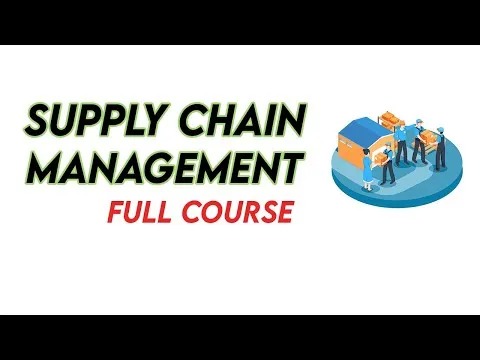
Supply Chain Sourcing 
This course introduces learners to the fundamentals of supply chain sourcing, including supplier selection and segmentation. Through the Supply Chain Management specialization, learners will gain the skills and knowledge to effectively manage relationships with thousands of suppliers and find the right vendors for their business. Upon completion, learners will have the tools and techniques to maintain the right relationship with any of their existing suppliers. ▼
ADVERTISEMENT
Course Feature
![]() Cost:
Cost:
Free
![]() Provider:
Provider:
Coursera
![]() Certificate:
Certificate:
Paid Certification
![]() Language:
Language:
English
![]() Start Date:
Start Date:
10th Jul, 2023
Course Overview
❗The content presented here is sourced directly from Coursera platform. For comprehensive course details, including enrollment information, simply click on the 'Go to class' link on our website.
Updated in [March 06th, 2023]
This course, Supply Chain Sourcing, provides an introduction to the exciting area of supply chain sourcing. It covers the supplier selection process and supplier segmentation, giving students the tools and techniques to find the right vendors and maintain the right relationship with any one of their existing suppliers. Through this course, students will gain an understanding of the importance of supply chain sourcing and how it can be used to create a successful supply chain. They will learn how to evaluate suppliers, develop supplier segmentation strategies, and create and maintain relationships with suppliers. By the end of the course, students will have the knowledge and skills to effectively manage their supply chain sourcing.
[Applications]
Upon completion of this course, students will be able to apply the concepts of supply chain sourcing to their own organizations. They will be able to identify the right suppliers for their needs, develop strategies for supplier segmentation, and create a process for supplier selection. Additionally, they will be able to develop and maintain relationships with suppliers, and understand the importance of supplier performance management.
[Career Paths]
[Title]Logistics Management
[Description]Logistics management is a critical part of any successful supply chain. This course will introduce you to the fundamentals of logistics management, including the planning, implementation, and control of the efficient flow of goods and services from point of origin to point of consumption. You will learn about the different types of transportation, warehousing, inventory management, and customer service. At the end of this course, you will have the skills to develop and manage a successful logistics system.
[Title]Supply Chain Analytics
[Description]Supply chain analytics is a rapidly growing field that combines data science and supply chain management. This course will introduce you to the fundamentals of supply chain analytics, including data collection, analysis, and visualization. You will learn how to use data to make informed decisions about supply chain operations, such as inventory management, pricing, and forecasting. At the end of this course, you will have the skills to develop and manage a successful supply chain analytics system.
[Title]Supply Chain Risk Management
[Description]Supply chain risk management is an important part of any successful supply chain. This course will introduce you to the fundamentals of supply chain risk management, including risk identification, assessment, and mitigation. You will learn about the different types of risks, such as supply chain disruptions, natural disasters, and cyber threats. At the end of this course, you will have the skills to develop and manage a successful supply chain risk management system.
[Education Paths]
1. Bachelor of Science in Supply Chain Management: This degree program provides students with a comprehensive understanding of the principles and practices of supply chain management. Students learn about the various aspects of the supply chain, including sourcing, procurement, logistics, and inventory management. They also gain an understanding of the global supply chain and the impact of technology on the industry.
2. Master of Science in Supply Chain Management: This degree program provides students with an advanced understanding of the principles and practices of supply chain management. Students learn about the various aspects of the supply chain, including sourcing, procurement, logistics, and inventory management. They also gain an understanding of the global supply chain and the impact of technology on the industry. Additionally, students learn about the latest trends in supply chain management, such as the use of artificial intelligence and blockchain technology.
3. Master of Business Administration in Supply Chain Management: This degree program provides students with an in-depth understanding of the principles and practices of supply chain management. Students learn about the various aspects of the supply chain, including sourcing, procurement, logistics, and inventory management. They also gain an understanding of the global supply chain and the impact of technology on the industry. Additionally, students learn about the latest trends in supply chain management, such as the use of artificial intelligence and blockchain technology.
4. Doctor of Philosophy in Supply Chain Management: This degree program provides students with an advanced understanding of the principles and practices of supply chain management. Students learn about the various aspects of the supply chain, including sourcing, procurement, logistics, and inventory management. They also gain an understanding of the global supply chain and the impact of technology on the industry. Additionally, students learn about the latest trends in supply chain management, such as the use of artificial intelligence and blockchain technology. They also gain an understanding of the research methods used in the field and develop the skills necessary to conduct research in the field.
Pros & Cons

Easy to understand

Real life examples

Informative

Introduction to supply chain and sourcing

Entretaining

Methodical material

Not enough work experience

Examples not up to date

Assignments not case studies

No procurement strategies included
Course Provider

Provider Coursera's Stats at AZClass
Supply Chain Sourcing introduces students to the fundamentals of supply chain sourcing including supplier selection and segmentation. With the Supply Chain Management specialization, learners will gain the skills and knowledge to effectively manage relationships with thousands of suppliers and find the right suppliers for their business. Learners gain an understanding of the supplier selection process, including the criteria used to evaluate potential suppliers, the importance of supplier segmentation, and the steps involved in selecting the right supplier. They will also learn how to assess the quality of a supplier's products and services, and how to negotiate the best terms and conditions.
Discussion and Reviews
0.0 (Based on 0 reviews)
Explore Similar Online Courses

Java Multithreading

Quickstart AngularJS 10 : First Version Of Angular

Python for Informatics: Exploring Information

Social Network Analysis

Introduction to Systematic Review and Meta-Analysis

The Analytics Edge

DCO042 - Python For Informatics

Causal Diagrams: Draw Your Assumptions Before Your Conclusions

Whole genome sequencing of bacterial genomes - tools and applications

MIT Free Supply Chain Management Courses

What Are Good Supply Chain Certifications?

Supply Chain Management (Full Course) SCM Lecture
 Related Categories
Related Categories
 Popular Providers
Popular Providers
Quiz
 Submitted Sucessfully
Submitted Sucessfully
1. What is the main purpose of this course?
2. What is the broader specialization of this course?
3. What will you have at the completion of this course?
4. Which of the following is NOT a part of the supplier selection process?
5. What is the main goal of supply chain sourcing?
Correct Answer: To find the right vendors and maintain the right relationship with any one of your existing suppliers.


Start your review of Supply Chain Sourcing